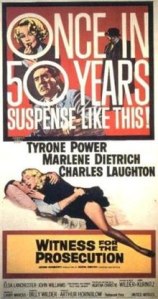Wilfrid the Fox! That’s what they call him, and that’s what he is! When Leonard Vole (Tyrone Power) approaches ailing veteran London barrister Sir Wilfrid Roberts (Charles Laughton) to defend him on a charge of murdering a wealthy widow who was enamored of him, going so far as to make him the main beneficiary of her will. Strong circumstantial evidence all points to Vole as the killer. Sir Wilfrid’s nurse Miss Plimsoll (Elsa Lanchester) objects on the grounds of her client’s ill health. Vole’s former wife Christine Helm (Marlene Dietrich) a German refugee provides an alibi for him. But then she turns up in court to testify against him and Sir Wilfrid is contacted by a mysterious woman, who (for a fee) provides him with letters written by Christine to a mysterious lover named Max … I am constantly surprised that women’s hats do not provoke more murders. Adapted from Agatha Christie’s 1953 stage play (based on her 1925 short story) by Larry Marcus with the screenplay by Harry Kurnitz (who had written whodunnits pseudonymously) and director Billy Wilder, who chose this project because he so admired its construction. Essentially, this is his Hitchcock film, a brilliantly made comic suspenser with rat-a-tat dialogue to die for and what an ending! And what stars! In a film which hugely improved on Christie’s characterisation, Dietrich smothers the screen with charisma in both her (dis)guises while Power is superb as the smooth charmer he made his own. Lanchester is gifted as many good lines as anyone in the cast including, Personally, I think the government should do something about those foreign wives. Like an embargo. How else can we take care of our own surplus. Don’t you agree Sir Wilfrid? Her real-life husband of course plays the wily lawyer and he is magnificent: his expressions and business are masterful. There are some welcome familiar faces – John Williams (a Hitchcock regular), Henry Daniell and Una O’Connor, the only original member of the Broadway cast to reprise her role. Beautifully staged and paced, shot by Russell Harlan on sets by Alexandre Trauner with Dietrich costumed by Edith Head, this breathtaking entertainment is a classic film, an object lesson in adaptation with wit and ingenuity to spare. Both Dietrich and Power sing I May Never Go Home Anymore (uncredited) and this is his last completed film. But this is England, where I thought you never arrest, let alone convict, people for crimes they have not committed
Category Archives: Marlene Dietrich
No Highway in the Sky (1951)
All boffins are a bit crackers but I suppose he’s the worst. Theodore Honey (James Stewart) is an apparently eccentric mathematician and aeronautical engineer charged with discovering what caused the crash of a ‘Reindeer’ airliner, a newly designed carrier for the Royal Aircraft Establishment. As he travels to investigate, he realises en route that he’s flying on the very same type of airplane. He believes that after 1,440 airborne hours the metal in the tail will bend and fall off, causing the plane to fall out of the sky. But he can’t persuade the captain Samuelson (Niall MacGinnis, bizarrely uncredited). Convinced it will suffer a similar accident, he deliberately sabotages it once it lands, and soon finds himself defending his sanity in an English courtroom. Fortunately, a sympathetic actress Monica Teasdale (Marlene Dietrich) and a stewardess Marjorie Corder (Glynis Johns) both believe his desire to prevent certain death and come to his defence … People must be someone else’s concern – I can’t let it be mine. Stewart is cast as a kind of mad scientist, complete with a young daughter Elspeth (Janette Scott) who cares for him rather than the other way round, forgetting which of the lookalike tract houses he occupies despite living there 11 years. This adaptation of Nevil Shute’s 1947 novel is so interesting after a protracted set up simply because it expresses so much of the time in which it was made: the post-war era, jet engine propulsion, families torn apart by WW2. And in the centre of it are two very different kinds of femininity – the international jet setter movie star played by Dietrich (who else?) and the no-nonsense, efficient and kind Johns, woman now working in the air but who has a background as a nurse, another casualty of WW2. Typecasting always works and it’s one of the pleasing oddities of this story that they’re not exactly in competition, rather both support Theodore. The fear that a plane will just … fall out of the sky is the kind of catastrophising that typifies most of our intercontinental journeys and it’s the explanation as to why this could happen that provides the drama and tension as well as characterisation – Stewart is fine as the befuddled man who nonetheless gets it right but at a cost, with terrible publicity and a potential future in the lunatic asylum. Metal fatigue can lead to mental fatigue, it seems. Lending great support are Jack Hawkins as company man Dennis Scott and Kenneth More as Dobson, the co-pilot, also uncredited, like the other pilot! Written for the screen by R. C. Sheriff & Alec Coppel & Oscar Millard, Shute probably wrote his story as a kind of purge – he had been an aeronautical engineer, involved first with the de Havilland company and then as a constructor with his own firm, the British government created a vehicle in direct competition with one of his designs which ended disastrously. He knew whereof he wrote. Directed by Henry Koster who of course directed Stewart in his previous film, Harvey, and they would work together again on Mr Hobbs Takes a Vacation and Dear Brigitte, also starring Johns. We never walked out on one of your pictures

